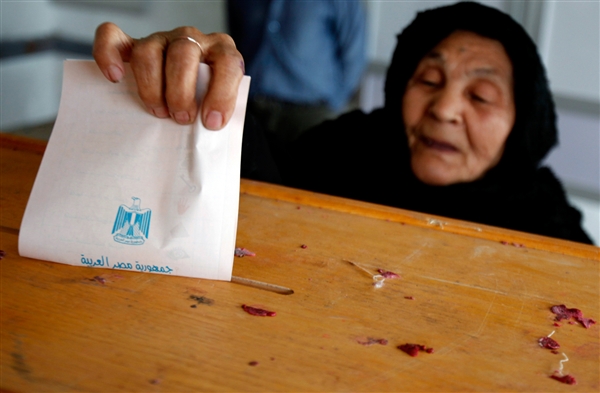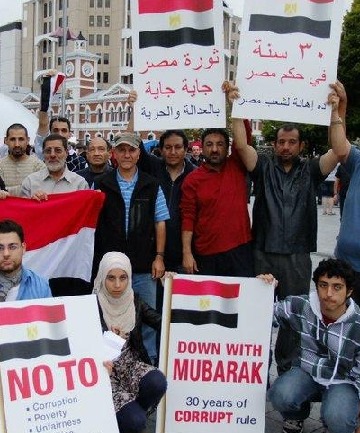 Nada Tawfeek is an Egyptian born activist currently residing in New Zealand. She wrote this first-hand account for The Spark after spending two months in Egypt; it again does not necessarily reflect a “party line.”
Nada Tawfeek is an Egyptian born activist currently residing in New Zealand. She wrote this first-hand account for The Spark after spending two months in Egypt; it again does not necessarily reflect a “party line.”
As the plane I was on approached Cairo, and I could finally see the pyramids after a good 24 hours of flying from New Zealand, I couldn’t help but wonder how different Egypt would be; whether it would already have changed or not. A part of me expected to step out of the plane to a brand new post revolution Egypt but the other part of me thought it would find the familiar hectic Egypt. Not long after leaving the airport I discovered that both my expectations were real. Although everything in Egypt looks the same as before the January revolution, the atmosphere is strangely different. Every radio station plays songs about the revolution and building a better Egypt, every Egyptian TV presenter now has a show about politics, the average Egyptian who most likely had no interest in politics a year ago could now talk about the different parties at length, and the closer the elections day got the more extreme this would seem.
The night before the Election Day was one of the most exciting days for many Egyptians since the revolution. Everywhere I went I heard young people talk about how they were incredibly proud that their generation got to witness a day like this, and older people talk about how this was the first time they had ever voted in their whole life. This day for many Egyptians was a challenge. Finally people felt that their voices were going to be listened to and that their vote would actually count, and people weren’t going to let this opportunity pass no matter how anxious they were. The fact that this was the first time most people were going to vote made the new experience one they were slightly scared of because no one knew what to expect. People were afraid that the old government and its supporters might have a plan in place, but the excitement overcame the fear.
The elections became the center of conversation, complaining about how far away the school you were going to vote in became a popular conversation starter before the election, and afterward it was replaced by how long you stayed in the queue. Some of the people I spoke to stayed for over 4 hours in line waiting to vote- but none of them were complaining, in fact everyone seemed to really enjoy the day. All in all the day was a success, the army were incredibly helpful at making sure everyone was safe and comfortable, the turn up was huge (60% turn up) and to top it all of the weather was fantastic. The votes were out the day after, the majority being for the Islamic parties, which most people felt was fair.

In the days following the elections the mood started to change. A sudden wave of havoc hit Egypt again. Some people started protesting against the fact that the army were still in control and called for a faster shift of power, but this time the protests were a lot different to the ones that happened in Tahrir Square. A number of people started burning the Egyptian institute; which is an extremely historically valuable library full of old books and maps that represent Egyptian history. Many people were confused at how anyone could try to destroy such a building and why they would. People started to question whether this was a plot by the old regime to create havoc or weather the army was behind this, many conspiracy theories were spoken about. The institutes’ director, Mohammad-Alsharnoubi was seen crying on TV and everyone was generally saddened by the loss of such an important building. The main question asked in all media channels was; “who are these people?” There was no real answer but people calling in on political shows seemed to want the army to intervene and ensure everyone ruining public buildings got arrested.
The army did intervene- violently. Videos of soldiers beating individuals were on every news channel and rapidly spread on the Internet. Everyone was extremely confused, no one knew whether the violent people caught on camera were actually the army or not, rumors spread that these were people dressed as soldiers rather than soldiers themselves. Egypt, if you watched the news, looked like it was on fire, but many other incidents like this had happened during the year and people knew that eventually everything would settle. After a while everyone calmed down and political parties agreed that everyone should keep safe and stay at home until the elections were over and the army could finally pass the power on to the elected government.
The blood and pain of anyone who suffered for the revolution would never be forgotten; people still keep the families of those hurt since January in their prayers. After the Egyptian institute incident things seemed to calm down. New years marked a new start for Egypt, Tahrir square was full of people again but this time to celebrate. Singers, actors, sheikhs and priests all gathered to celebrate and pray for a new and safe year while the crowds cheered for them and for Egypt. Ever since then things have been considerably stable and personally I’m pretty optimistic at what the future holds for Egypt.

Just another WordPress site